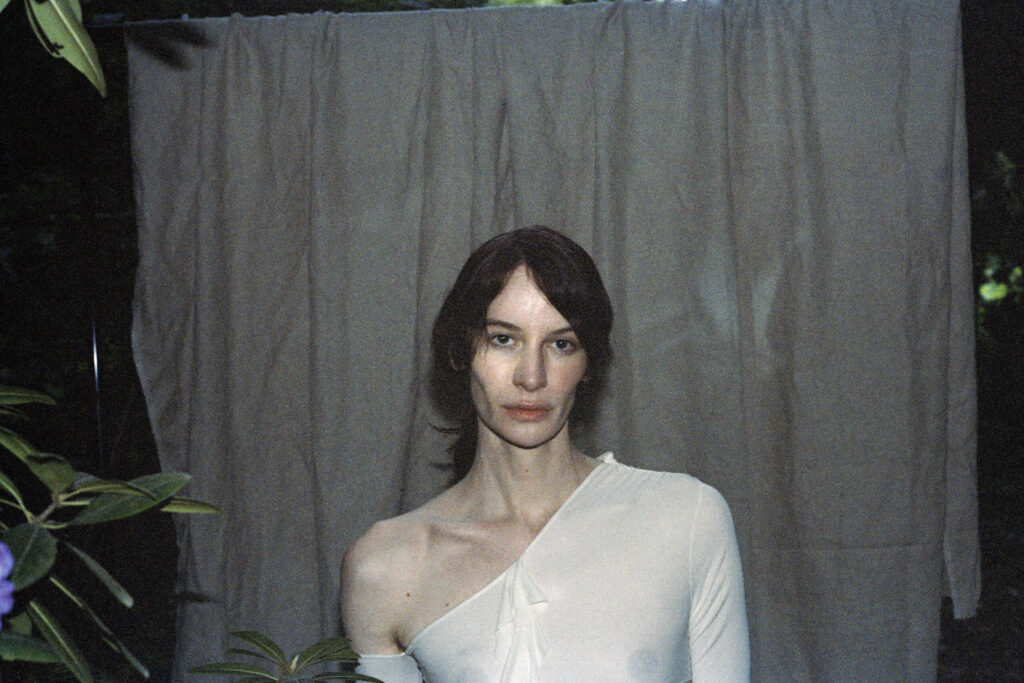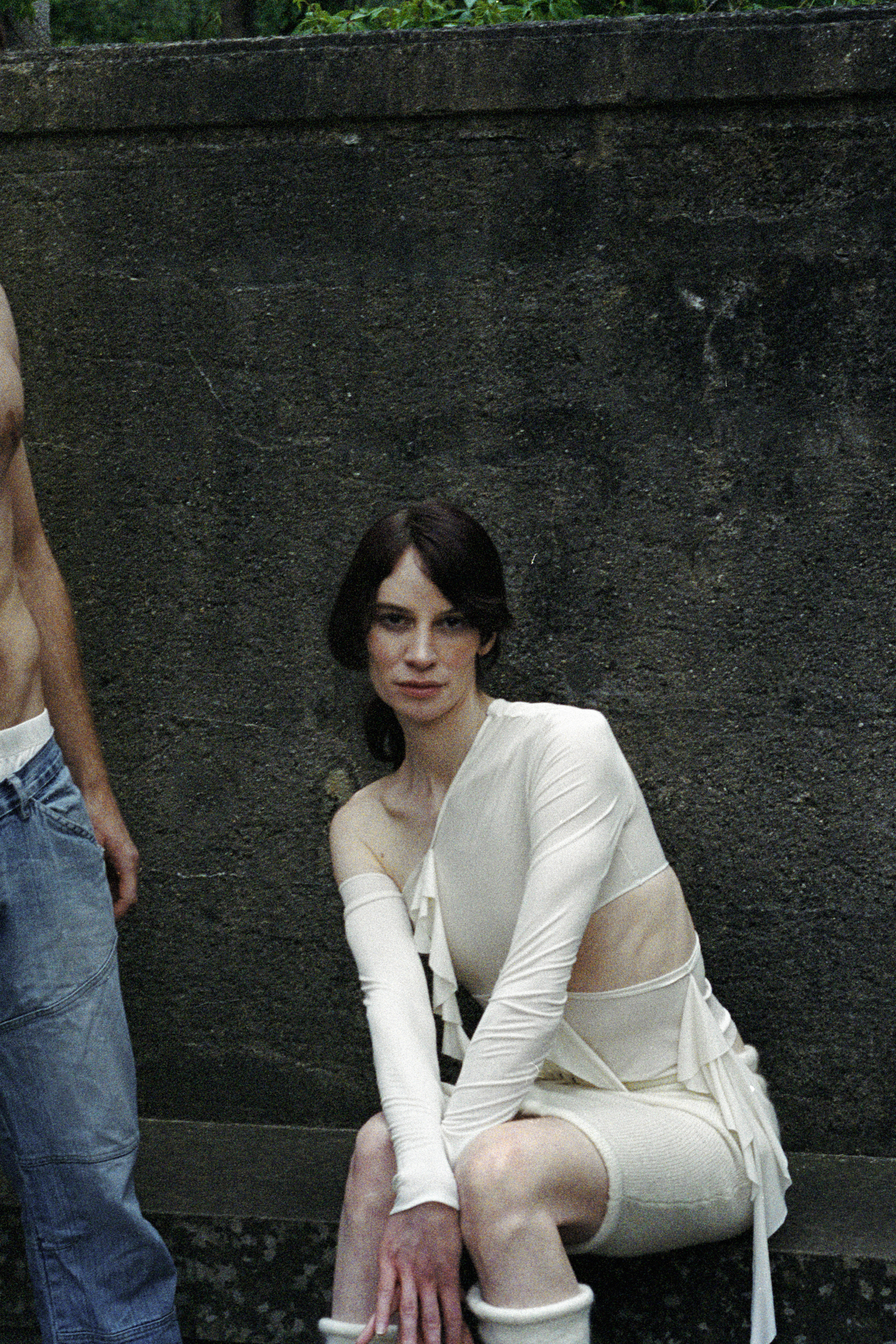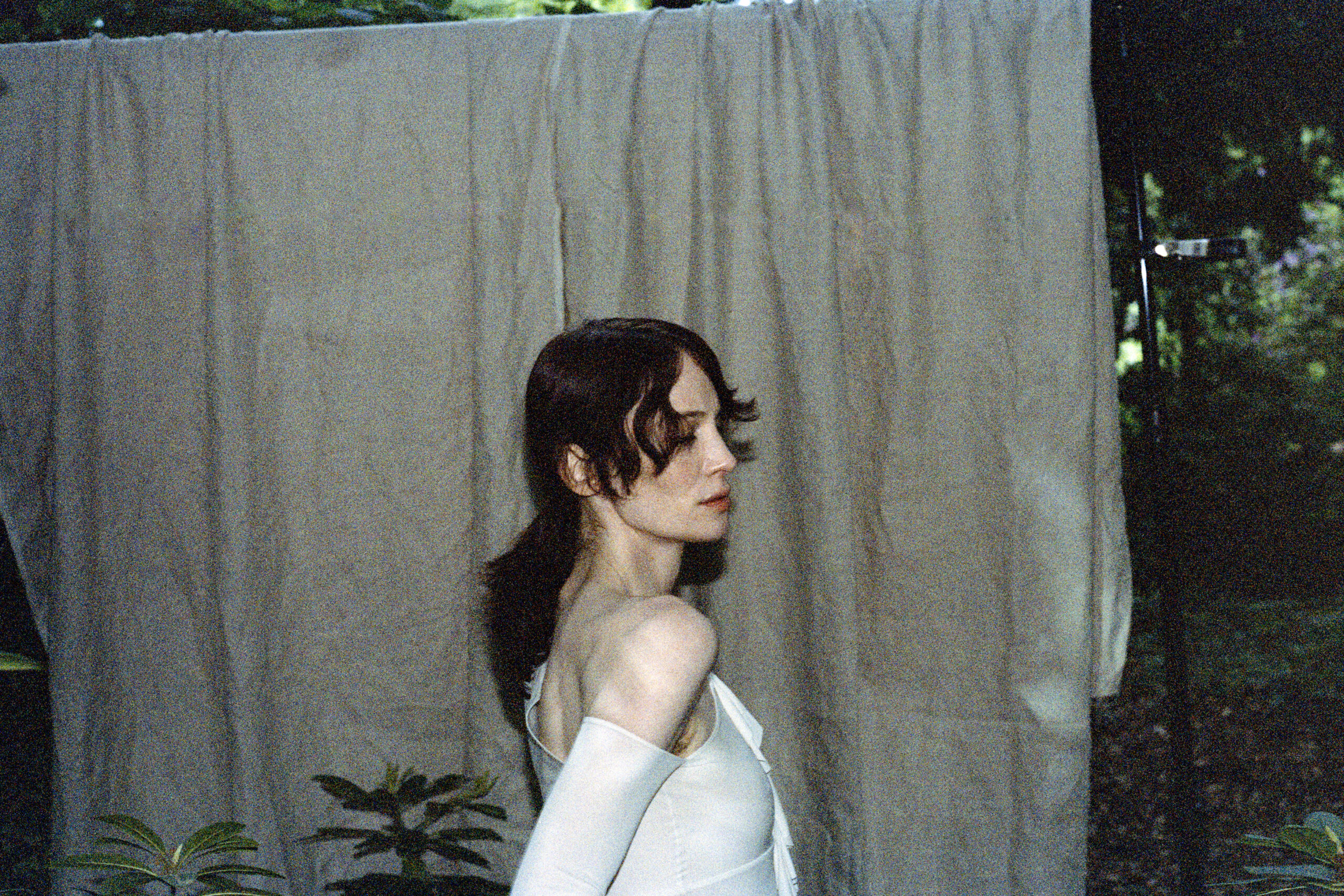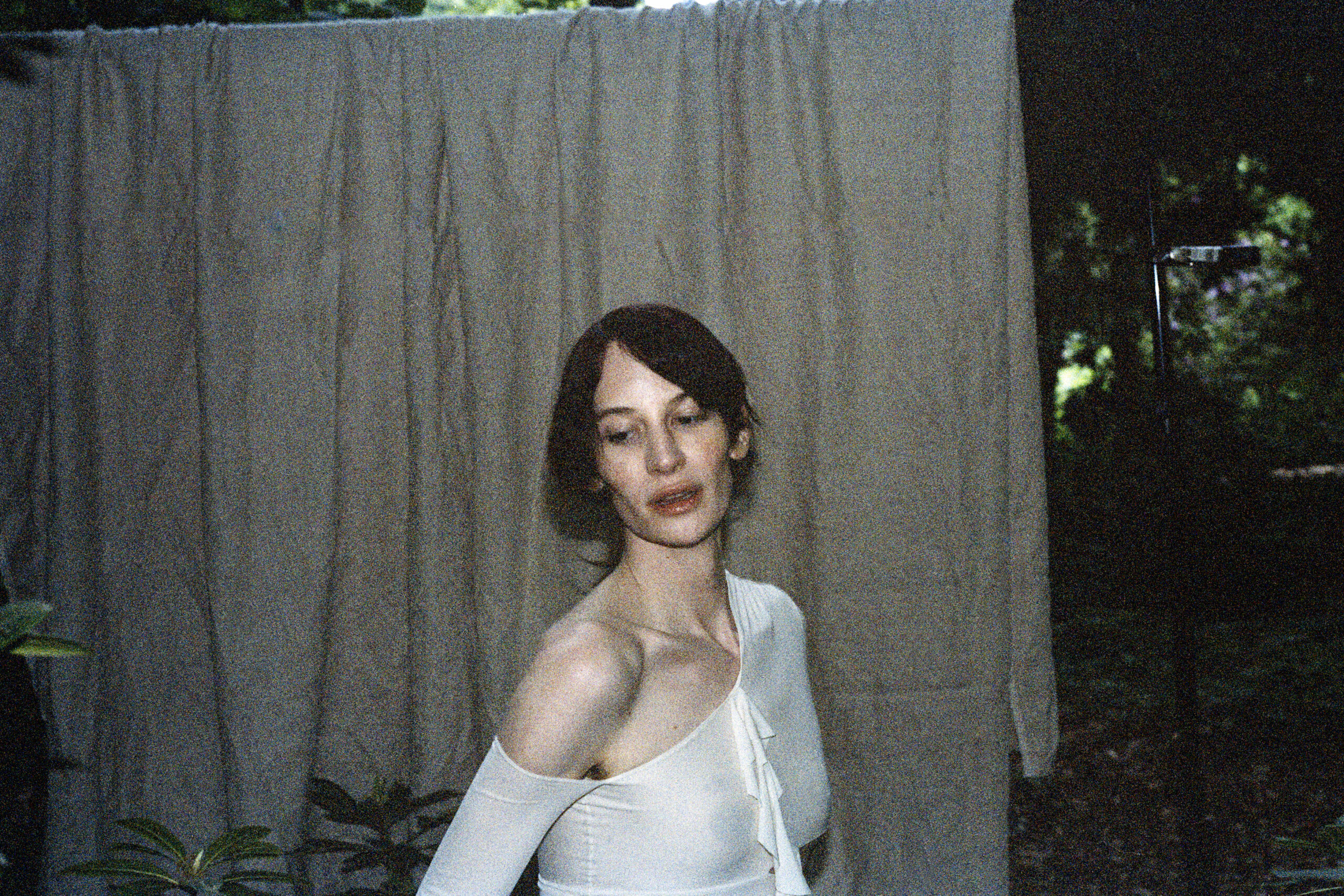Lyra Pramuk has a high spice tolerance. We’re speaking about food here—she likes dishes that make her nose and eyes water. But it’s not just that; the Berlin-via-Pennsylvania electronic-music producer is drawn towards all manners of intensity. Fountain, her 2020 LP, is both wildly playful and structurally rigid, twisting her vocal cords into a Mobius strip and laying them bare—a capella music without a single voice to speak of. Hymnal, her just-released follow-up record, does something similar with choral music, Devil-may-care electronics, and “modern classical” idioms. The record, out this week, suggests centuries of liturgy and stained glass, but it also calls to mind devotion in its most holy of contexts, mantra-riddled prayer wheels, and dog-eared biblical texts. If Fountain found Pramuk zooming in, then perhaps Hymnal is the sound of her zooming out, staring at the stars and finding a kind of far-flung delirium in the process. A few weeks ago, Pramuk and I got on a Zoom call to dig into what makes her work tick, diving down all manner of rabbit holes in the process: The Legend of Zelda and Louie Vega, techno-optimism and touching grass, hero worship and mysticism, and so much more.
———
MICHAEL MCKINNEY: Hello! Are you in Berlin right now?
LYRA PRAMUK: Yeah, I was filming some stuff earlier today and just had lunch.
MCKINNEY: What were you filming?
PRAMUK: Maybe it’s quite standard these days, but I was shooting some TikToks.
MCKINNEY: What’s your relationship to that platform? I always found it strange.
PRAMUK: I wasn’t really sure what to make of it when it started to get really popular. I stayed off for a while and was reading these stories of Tourette’s influencers making videos, and then kids getting Tourette’s from the Tourette’s videos on TikTok. I was like, “Okay, there’s some crazy brain-wiring stuff going on here.” I was skeptical for a while, but I’m getting into this mode right now with how I approach communications, so I’m more open to these independent creator platforms. I’ve been using TikTok more for the last six months.
MCKINNEY: What is it about this style of communication that draws you to it?
PRAMUK: I feel naturally gifted as a public speaker. I’ve done a lot of hosting. I like to do interviews. So these spoken formats work well for how I transmit and process information.
MCKINNEY: I want to roll the clock back a bit. What is some of the first art, whether it’s music or another media, that you remember really connecting with?
PRAMUK: My earliest are probably around five years old, singing in church choir and performing in community theater as a child. Around that same time, we had access to Nintendo and Xbox. I had exposure to art through video games before any medium.
MCKINNEY: What were you playing?
PRAMUK: Super Smash Brothers, Star Fox, Zelda.
MCKINNEY: The original over-world one?
PRAMUK: Yeah. But I would also say, something I’m processing with this coming album is also, is nature not art? I grew up in the country. My mother’s garden had these beetles with this iridescent exterior. They’re so shiny, I was obsessed with them. I’m very sensory seeking. I was also obsessed with the crystals on chandeliers. We would go to this vintage market and they had all of these old broken chandeliers with the crystals in jars and I wanted to collect them.
MCKINNEY: Did you get to?
PRAMUK: I had a couple, and I would collect insects and beetles too. I’d hold them and realize that they’re living things and then suffer with the fact that I’d just taken this thing’s life. There were so many fireflies when I was growing up and we would catch them and put them in jars.
MCKINNEY: You’d poke holes in the mason jar and do the whole thing.
PRAMUK: Yeah. So my sense of possibility and aesthetics was cultivated with the early internet and video games, but I was very embedded in the suburban and rural, so there was a sense of nature infused with that. When I was 15 or 16, I would have these fantasies of electrical forests, a harmonious balance between digital tech and botanical ecosystems.
MCKINNEY: Are you still trying to balance that?
PRAMUK: Yeah. We’ve produced an experimental art film with this British video artist, Lucy Beach, and my partner Krzysztof Bagiński. There’s this whole aesthetic sensibility in the film of the ecological remediation systems Lucy works with. For example, one of the big shots that we worked on is a wave pool generator at this facility in Germany where they test erosion from storm conditions. She also works with a sanctuary for oysters and managed to get close-up footage of oysters being born. It’s beautiful and strange. All this natural footage is mixed with technological footage. She’s worked with these robots that are contracted to enter and repair sewage pipes with a camera mounted on their head. There’s also footage that my partner shot of my skin and my face and my mouth. There’s sensuality of the voice and the storytelling, the human element, but also all of this footage of nature being remediated through tech. It ends up feeling quite surrealistic, and that’s the point.
MCKINNEY: It does feel like, especially now, that relationship might be critical if you’re thinking about AI and climate crises and all that. It’s interesting to say, “What positive relationship can we imagine here?”
PRAMUK: Exactly.
MCKINNEY: Is framing it in a more optimistic way part of the project?
PRAMUK: I think that so much of my practice has been a river of grief for other disenfranchised people and life forms. There are so many species of trees that don’t even exist anymore because they’ve been eradicated. It’s important to make an emotional connection in a post-human sense, to feel ourselves as other creatures. That’s something that trans people and people who are oppressed by white supremacy are much more able to feel because we understand what it’s like to be disallowed by some authority, so it’s easier to see a butterfly and be like, “I’m like that guy.” It’s not humanity that’s at stake, it’s the ecosystem. To count yourself as one part of a natural whole is such a different argument from some humanistic rationale for climate rescue. I mean, there are climate scientists who argue that everything is okay because humanity is doing relatively okay. It’s a philosophical failure. I’ve loved [Rosi Braidotti]’s writing since I started doing press with my first album five years ago. It gives a political language to a post-humanistic framework of thinking. We need practical languages that expand our sense of what we are.
MCKINNEY: To take it from theoretical text to actionable items.
PRAMUK: Yeah. I think if you can feel it, you don’t even have to understand it. And being a trans person at a time when trans rights are at stake internationally more so than they have been in 10 or 15 years, it’s become even more apparent to me that I need to define my own sense of identity and spirituality. I have other friends who are trans women of color, who have more defined cultural lineages to call upon. As a white American trans person I haven’t felt a deep connection to any kind of ancestral identity. I’m really inspired by Afrofuturist thinkers who’ve built entire lineages of culture that are speculative from loss and amnesia to a more positivistic identity. I know from my own research that there were trans people in Europe before the Third Western Industrial Revolution who were doing mediumship and fortune-telling and practices that you might call shamanistic. It’s a social role that I felt for myself intuitively since I was a child, that I should do poetry and music and my life would be quite mystical. I feel grounded knowing that I am exactly who I’m supposed to be, and that there have been queer and trans creatures throughout nature for all of time. Nature is one of the best educators, because it’s what we are.
MCKINNEY: How do you practice learning from it?
PRAMUK: On a very basic, fundamental level, I love to read stories and watch nature docs. I feel like deep listening is embodied listening and it’s more than just your ears that are sensing. Some people are so blocked from feeling with their whole nervous system, and I think psychedelics can help. They can also be abused, but I’ve had intense experiences just with a sunset or by the sea. There’s a tree in my backyard that’s one of the oldest trees in Berlin, and the first time I went to touch it, I just cried for three minutes. They hold so much information. 90 percent of people that I encounter don’t have a deep connection with the natural world. I feel sad for all of us who have been brainwashed to think that reality is a system that was designed to exploit us. I think the ways that we have structured reality through the Enlightenment era is narrow, and we now have large language models that are being built according to the same very narrow protocols. I am a postmodernist, I’m not trying to do away with technology. But what if we all just calmed our nervous system, logged off for a bit, and touched grass?
MCKINNEY: Is that part of the goal with pop.soil?
PRAMUK: For sure. I wanted to start pop.soil because I’ve been so frustrated with music industry norms and the commodification of music. I’m interested in song form and how we tell stories through music. Throughout most of human history, music and poetry were deeply connected. And then the record industry became another exploitation marketing machine, but for most of human history, music was about community and storytelling and healing. It had all these other social functions that have been entirely lost.
MCKINNEY: Yeah.
PRAMUK: My music is quite weird, but I don’t want to write a song that sounds like a song right now. If it’s too formal and comprehensible, it starts to feel like a capture device or something. Pop music marketing is so manipulative. It’s very enticing, very hi-fi, and very alienating. You’re selling an experience to young people to pay $350 to come to a giant stadium to see someone who’s like a demigod. I think if I had a daughter who was 20, I wouldn’t want her to experience music like that. It’s just so dehumanizing.
MCKINNEY: I want to ask about your interest in folk music. I’m interested in the idea of it not as a genre, but as an idiom of music practiced by common folk.
PRAMUK: Yeah. It’s a lot more than a genre. Folk is a really powerful political tool as a counter to pop music. When you deploy a word like folk in that context, it can also be about connecting and organizing people around certain ideas that are more organically aligned around community rather than commerce. And it used to be like that. Electronic dance music history having lineage from Detroit or Little Louie Vega, that’s folk to me. Classic house as a revival of disco is folk. There’s incredible potential in a broader idiomatic sense.
MCKINNEY: Would you place your new record in that same framework? Is it folk music?
PRAMUK: I want it to be. I think the sound is very primal and very accessible. It’s very pure in the sense of these pulsing strings washing over your body and the voice having this folkloric quality. I basically tried to make a post-Detroit dub, techno-inspired, acoustic folk record.
MCKINNEY: Can you walk me through your state coming into the record?
PRAMUK: I work in a way that’s so intuitive, and I’m very attracted to the minimalism of voice-string. I think most songs that have been written by humans have been voice-string, whether it’s guitar or some other stringed instrument. I love the simplicity of that. I was listening to a lot of Dowland and Steve Reich and Bartók and I was like, “I want the whole thing to be strings.” I think they so beautifully represent ancient tenacity and wisdom. And I was having a lot of grief. I had been diagnosed with melanoma that same year, and it was early enough to be able to cut it away. But I had a major surgery that was very, very difficult, and I really felt my own mortality in connection with the fragility of our planet. I found strings really healing.
MCKINNEY: Okay.
PRAMUK: The demos and chord progressions were just flying out of me in the studio, and I was crying. Then I adapted them with a string bank and I found this quartet in Berlin named Sonar Quartet, and we worked on the arrangement with Francesca, my arranger. I conducted them, and when the parts would loop, it had the constant energy that you get from electronic music.
MCKINNEY: You’re again in that space between the electronic and the organic.
PRAMUK: Exactly. I love minimalism and loops. I like to challenge the linear notions of time, which I think is modeled in the circularity of my albums. Minimal techno, certain African folk music, percussion, all this is nothing if not circular trance music. I consider my music to also be trance music, in a way. For me, time is not linear, and I want to have a conversation about that.
MCKINNEY: Sure.
PRAMUK: I think that strings and voices are the same, too. Vocal cords actually function like strings.
MCKINNEY: Physically?
PRAMUK: Yeah. If you put your finger down on a string, it shortens it and makes a higher pitch. Women have higher voices because the vocal cords are smaller. They vibrate like strings. I actually just made a mix for NTS that’s featuring all string music. Homogenic by Björk is one of my favorite records ever. She recorded with a string sextet in Spain in a way that she sounds really close. No one can touch her in terms of innovation. I mean, she’s just done everything. She’s mother, and we know it, but I did think to myself, “I feel like you could go closer than Bjork,” so I did.
MCKINNEY: I love that. You mentioned to me that you grew up singing in church. Talk to me about your relationship to spirituality.
PRAMUK: I sang religious music and Black gospel in a number of choirs until I was 23. I would say that was my main musical experience. The balancing of different voices can create something even more beautiful than a soloist. In terms of spirituality, I think there are few things more beautiful than 20 to 160 people abandoning their disbelief and arrogance and really believing in it to rehearse a piece of music with each other.
MCKINNEY: That shared devotion.
PRAMUK: And the literal sonic experience of vibrating with so many people together. I’m also very inspired by Sufi poetry and music. Many belief systems can coexist and gel into something that is unique and pluralistic.
MCKINNEY: Whether that’s at Central Park or a Unitarian church or Paradise Garage.
PRAMUK: Exactly. And the process of realizing my transness is also a very spiritual process. It’s something that I still struggle to put into words. I know that, for example, there are schools of fish where there might be 30 of them, and it’s one male and 29 females. If the male dies, the strongest female will autonomously go under a rock and convert into a male. What I’ve learned about transness in nature is that it often happens due to ecological necessity. I’ve fantasized that perhaps I’m not trans because of some inalienable feature of my genetics or my soul, but because the feminine energy I embody is needed in this life. Can a certain environment make someone trans? Maybe, maybe not. That’s also a spiritual question, but I think the kind of stewardship I want to do of natural ecosystems and my transness are very connected. I feel very connected to Anohni in that sense.
MCKINNEY: Right. Talk to me about your relationship to improvisation. When did your work last surprise you?
PRAMUK: I think improvisation is also about having structure. There’s a misconception that it’s totally free. It’s about having enough structure to be free, enough limitation to be maximal. In the show for Hymnal, which I’m touring, I improvise a lot. Fountain was more rigid in a way, as an experimental pop idiom. But for this one, I worked with my friend Nadia Marcus, who is a poet, and she wrote poems for the whole record, which I then created a score with. Every track has a cluster of words that I was improvising with. All the vocals were improvised.
MCKINNEY: Oh, really?
PRAMUK: Yeah. That feels folky to me because you don’t have these very arranged and written top line moments that you would have in a Bob Dylan song, for example. It feels very connected to the kind of fractured nature of dub. Basically, when I moved to Berlin and I started clubbing, I had just finished a classical voice degree and I had memorized and sung 150 songs in like 10 different languages. Then when I started the practice that became Fountain in 2016, I started working with my voice as a trans woman, and it was a whole different process. My writing was improvising while I was on the dance floor. That’s my foundation as a composer, essentially. It’s very kinetic. That’s why dancers love my music because there’s movement in it. I was improvising melodies and hockets and vocal harmonies on the Berghain main floor a lot.
MCKINNEY: Yeah?
PRAMUK: And I would just be by myself. That’s still kind of how I write music.
MCKINNEY: That’s hysterical. I do exactly the same thing, but with alternative drum programming.
PRAMUK: I love that. That’s also a kind of improv.
MCKINNEY: Absolutely. I mean, I come from a jazz background and it’s something I can’t get away from.
PRAMUK: That’s so fun. Minimal techno is such a beautiful canvas to come up with ideas.
MCKINNEY: Are you familiar with conducted improvisation?
PRAMUK: I don’t think so.
MCKINNEY: I saw Tyshawn Sorey, who’s a really great figure in American new music, do a performance where he actually got these sheets of paper and just scribbled on them in Sharpie as signifiers to the violas, to the upright basses.
PRAMUK: That’s what I do with the string quartet too. I’ll call changes on the microphone and they’re in their in-ears. I also wrote a piece also for Manchester Collective that was called Quanta, inspired by Carlo Rovelli’s book, The Order of Time. It’s a pop science poetic treatise on his understanding of the poetic, philosophical impact of his work as a quantum physics researcher of 40 years. So the piece is a score of sections with different notes with a poetic idea. I’m asking them to improvise the harmonic melodic material at their own time. The idea essentially being, you can’t see electrons until they bump up against each other, and they’re on stage as soloists with blindfolds on. There are beautiful moments where their solos kind of collide with each other.
MCKINNEY: I love that.
PRAMUK: I want to empower instrumentalists, not make them feel like they’re on a session job. I want my music to be a space where people can grow and play. I don’t see enough people doing that, but I know in the US it’s happening more than in Europe. Admittedly, the European scenes are more conservative. Things still feel very Bill Evans over here. Even though there are experiments happening, the American spirit for experimentalism in music is quite distinct, like Tyshawn Sorey. Even though I’m transplanted over here, that feels very much my lineage.
MCKINNEY: Absolutely. Truly, congratulations on the record. I think it’s a real knockout.
PRAMUK: Thank you so much. I hope you can feel the electronic music history in it too, even though it’s so acoustic.
MCKINNEY: Absolutely.
———
Styling assistant: Josephine Winkler
Content shared from www.interviewmagazine.com.




